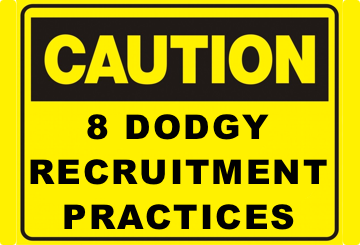
8 dodgy recruitment practices that all candidates should be aware of
There’s no getting away from it – elements of the recruitment industry suffer from a bad reputation and hearing some of the stories our candidates tell us, we’re not surprised.
But the bad boys can be spotted and avoided if you look out for the following eight bad recruitment practices:
1. Asking the candidate for a fee
As a candidate you should not generally be asked for money by a recruiter – either up front or in the event that they find you a job. Fees are normally only paid by the client, and only when a candidate is placed. Recruiters asking for a fee from the candidate are not the norm and should be approached with caution.
2. Advertising jobs that don’t exist
There’s nothing more frustrating than applying for a job or calling about it to be told that the role has already been filled. Of course, there can be a short delay between the job being filled and the ad being taken down, but there are also some unscrupulous recruiters who post spurious ads in order to attract new candidates for future roles.
Whilst it is sometimes useful to get registered with an agency even if they don’t have anything for you right away, who wants to work with a business that routinely dupes candidates to get them on board?
3. Not sharing your details
Most recruitment consultants look after a certain number or type of roles at their agency, with their colleagues doing similar. If you are open to roles across a number of related areas, it’s in your best interest that all of those consultants have your details and are free to contact you about relevant roles. However, an unscrupulous consultant might keep your details to himself, in order to keep the potential commission you represent.
In an ideal world, the consultants would champion you internally, recognising your transferable skills and sharing your details, but you may find you need to contact each one individually to get the best results.
4. Encouraging you to lie or lying on your behalf
A consultant who suggests that you lie to the client or who misrepresents your experience in order to get you an interview is to be avoided at all costs. We’re all for ensuring your CV represents your experience in the best light, but don’t be persuaded to use outright lies or exaggerations. By doing so, you risk looking foolish in front of the client and a consultant who encourages this will eventually lose the client’s trust too.
5. Sending your CV to clients without your permission
You should be in control of where your CV is sent. Good, honest recruiters will always ask your permission before presenting your CV to a client. However, most client contracts stipulate that once a CV is presented to a client, that recruiter ‘owns’ your CV for a period of time (usually 6 months), which can encourage the less reputable recruiter to ‘spam’ your CV in order to stake their claim.
Having your CV presented to the same client by more than one recruiter it not ideal – it makes you look disorganised and potentially desperate. By choosing your recruiters wisely and sticking to one or two that you trust you are more likely to be able to keep control and protect your personal brand.
6. Using your contacts as leads
We all like to get new business in and there’s nothing wrong with a well placed recommendation. However, if your recruiter is more interested in contacting your references to ask for a brief than to assist you in your job hunt, alarm bells should ring.
Similarly, persistent quizzing for the name of your previous boss or HR Manager can be a red flag. There’s nothing wrong with a bit of networking but you should be made aware if the consultant is planning to use your name as an introduction device.
7. Pushing you towards certain jobs
Your consultant should be looking to find you a position that meets your career aspirations, not just one that makes them a quick and easy commission. If you feel that your consultant is not listening to you and persistently suggests the type of role you’ve said you’re not interested in, think about finding a new consultant!
8. Not giving feedback after an interview
You’ve been through the stress of attending an interview, so you deserve to hear what the client thought of you. It’s the consultant’s job to get a de-briefing from the client and to pass on the feedback (good and bad) to you. But there are consultants who de-prioritise offering feedback unless it’s going to progress to the next stage.
There are of course occasions when the client is hard to get hold of for feedback, but if the consultant has built up a good relationship, these instances should be few and far between. At the very least, your consultant should continue trying to get feedback and be able to coach you on how to improve next time.
Remember – we’re not all bad!
Stopgap was set up in 2000 with the goal of challenging the recruitment industry's reputation for bad practice and poor service. That’s how we’ve grown to be successful and that’s what defines ‘The Stopgap Way’
Non-commissioned, collaborative and experienced marketing consultants who share candidates across the business - meet the Stopgap team
Specialist sector teams with focused areas of expertise. Check out the sectors we cover
Providing a service that’s highly recommended by clients and candidates alike.
Maintaining a unique and positive culture that promotes low staff turnover.
Real commitment to coaching and supporting our candidates before, during and after placements

